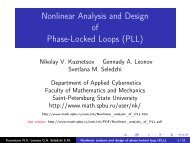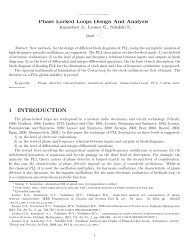Technical Sessions – Monday July 11
Technical Sessions – Monday July 11
Technical Sessions – Monday July 11
You also want an ePaper? Increase the reach of your titles
YUMPU automatically turns print PDFs into web optimized ePapers that Google loves.
MA-19 IFORS 20<strong>11</strong> - Melbourne<br />
The Second Periodic Tariff Revision (PTR) Cycle for the Energy Transmission<br />
Sector in Brazil defined new annual permitted revenue (APR) for the concessionaires.<br />
This process used the NDRS model of DEA to create scores that<br />
would work as parameters for the revenue calculation. At the end of the process,<br />
the concessionaires had huges revenue losses in comparison with the First<br />
PTR in the year of 2005. This paper aims to expose the energy market impacts<br />
created by the methodology used, the regulators errors while applying the analysis<br />
and projections to a possible III PTR.<br />
� MA-19<br />
<strong>Monday</strong>, <strong>11</strong>:30-13:00<br />
Meeting Room 216<br />
Making OR More Interesting For Students<br />
Stream: Education and Operations Research<br />
Invited session<br />
Chair: Khehla Moloi, University of Limpopo, Polokwane, South<br />
Africa, KHEHLA.MOLOI@ul.ac.za<br />
1 - Helping Students Understand Basic Probability<br />
through a Method for Calculating Probabilities in Ball<br />
Games According to Scores During the Matches Using<br />
a Spread Sheet<br />
Nobuyoshi Hirotsu, School of Health and Sports Science,<br />
Juntendo University, 1-1 Hiragagakuendai, 270-1695, Inzai,<br />
Chiba, Japan, nhirotsu@hotmail.com<br />
We teach basic probability to athletes (students), but we come across the problem<br />
how we can help them understand it. They are taught how to use a spread<br />
sheet in a course of computer literacy. So, using a spread sheet we try to teach<br />
them how to calculate probabilities in ball games which they are familiar with.<br />
In practice, we introduce a method for calculating probabilities in ball games<br />
such as tennis and soccer according to scores during the matches. We discuss<br />
the student reaction based on anecdotal evidence we have observed.<br />
2 - Games and Interactive Activities in OR Classroom<br />
Mariana Funes, Facultad de Ciencias Económicas - Universidad<br />
Nacional de Córdoba, Avda. Valparíso s/n Ciudad Universitaria,<br />
5000, Córdoba, Argentina, mfunes@eco.unc.edu.ar<br />
Student motivation and engagement with their learning are a constant challenge<br />
for teachers. Considering that games get students involved and promote<br />
learning opportunities, games were implemented that significantly contributed<br />
to make students feel uninhibited and to increase their participation in solving<br />
analytical and reflective activities designed to strengthen their knowledge. The<br />
presentation deals with the games and activities developed and the obtained<br />
results.<br />
3 - Creating Excitement in Operations Research Classroom:<br />
A Case of the University of Limpopo<br />
Khehla Moloi, University of Limpopo, Polokwane, South Africa,<br />
KHEHLA.MOLOI@ul.ac.za<br />
In this paper the author will demonstrate how active learning can engage students<br />
in such high-order thinking tasks such as analysis, synthetic and evaluation.<br />
The paper argues that student’s throughput and quality improves drastically<br />
when active learning technique is employed as opposed to passive learning.<br />
The author will also address challenges/ obstacles associated with active<br />
learning such as mega-class, lack of needed material, time or resources, nonparticipation<br />
of students. Most of these challenges/ obstacles can be overcome<br />
through careful, thoughtfully planning.<br />
� MA-20<br />
<strong>Monday</strong>, <strong>11</strong>:30-13:00<br />
Meeting Room 217<br />
Soft OR I<br />
Stream: Soft OR and Problem Structuring<br />
Invited session<br />
Chair: Vicky Mabin, Victoria Management School, Victoria<br />
University of Wellington, PO Box 600, 6140, Wellington, New<br />
Zealand, vicky.mabin@vuw.ac.nz<br />
10<br />
1 - Shaping Sustainable Communities: A Case of Urban<br />
Water Management<br />
Robyn Moore, Victoria Management School, Victoria University<br />
of Wellington, 16 Kotipu Place, Pukerua Bay, 5026, Porirua,<br />
Wellington, New Zealand, robyn@j.co.nz, Vicky Mabin<br />
While water is relatively abundant in New Zealand, the quality of freshwater<br />
is a concern, given the value New Zealanders place on their ’clean green’<br />
reputation and outdoor lifestyle. This Community OR project examines the<br />
challenges and possibilities facing Kapiti community’s aim of sustainable urban<br />
water management. This case study examines how Theory of Constraints,<br />
Stakeholder Typology and Causal Loop Diagrams were used to capture and<br />
examine stakeholder perspectives, inform decision-making and improve urban<br />
water management outcomes.<br />
2 - Offshore IT Outsourcing between India and New<br />
Zealand: A Systemic Analysis<br />
Arun Elias, Victoria University of Wellington, FC, Wellington,<br />
New Zealand, arun.elias@vuw.ac.nz, Saji Mathew<br />
Although both India and New Zealand recognise trade between the two countries<br />
as important, trade in information technology between the two nations has<br />
been very low. This research seeks to structure this problem situation systemically<br />
to understand the complexities underlying this uneven profile of India’s<br />
outsourcing. This study takes a service provider perspective. A causal loop<br />
model is developed to explain the counterintuitive problem situation. Finally,<br />
strategies to improve the problem situation are explained using an analysis of<br />
the feedback loops captured in the model.<br />
� MA-21<br />
<strong>Monday</strong>, <strong>11</strong>:30-13:00<br />
Meeting Room 218<br />
OR in Agriculture<br />
Stream: OR in Agriculture<br />
Invited session<br />
Chair: Marcela Gonzalez, Departamento de Modelación y Gestión<br />
Industrial, Universidad de Talca, Merced 437, s/n, Curicó, Región del<br />
Maule, Chile, mgonzalez@utalca.cl<br />
1 - A Periodic Tabular Policy for Scheduling of a Single<br />
Stage Production-Inventory System for Agricultural<br />
Products<br />
Krishna Sundar Diatha, Productions and Operations<br />
Management, Indian Institute of Management, Bannerghatta<br />
Road, 560076, Bangalore, Karnataka, India,<br />
diatha@iimb.ernet.in, Shashank Garg<br />
In a production system that handles perishable raw materials, scheduling of<br />
the production facility plays a vital role. In this paper, we consider scheduling<br />
of a single stage production-inventory system in the presence of uncertainty<br />
regarding demand patterns, production times and switchover times. We derive<br />
approximations for the first two moments of demand over lead time using<br />
residual service analysis of vacation queue models and determine optimal production<br />
frequencies for individual types. The numerical study demonstrates the<br />
effectiveness of the proposed policy against cyclic policies.<br />
2 - An Integer Linear Model for Scheduling the Cutting Process<br />
in Swine Industry<br />
Marcela Gonzalez, Departamento de Modelación y Gestión<br />
Industrial, Universidad de Talca, Merced 437, s/n, Curicó,<br />
Región del Maule, Chile, mgonzalez@utalca.cl, Rodrigo<br />
Sanchez<br />
An integer linear model is developed for supporting decisions about pork cutting<br />
process in a plant, considering demands, production lots sizes, inventory<br />
level of each product, capacity constraints, warehouse restrictions, production<br />
periods, products shelf life, aiming to maximize the company profits. The<br />
model is applied for scheduling the cutting process in a Chilean swine company.




